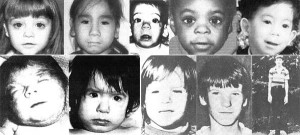
Womb Wounds: Fetal Alcohol Syndrome Disorder
“Fifteen years ago there were very few people who knew about FASD. If you were to go to court and say, ‘My son or daughter has FASD,’ a judge wouldn’t even know if it was a real thing.” – Jonathan Rudin, Justice Committee Co-Chair at the FASD Ontario Network of Expertise
Recently referred to as an “invisible condition” by the popular Canadian newspaper, The Globe And Mail, Fetal Alcohol Syndrome Disorder (FASD) often goes undiagnosed.
A supervisor at the Toronto Children’s Aid Society described to the Trauma & Mental Health Report the stream of FASD cases that have recently found their way into youth care and justice systems.
“You often don’t know a child has FASD because the mother is not around to confirm alcohol exposure during pregnancy. With one case, we suspected it, and did some digging. The grandparents of the child confirmed that the mother did consume alcohol during pregnancy. It was the grandparent’s report that changed everything. Nobody would have known.”
Characterized by growth deficiencies, distinctive facial features, and central nervous system damage, FASD is an incurable condition. According to Ernest Abel, Professor of Obstetrics and Gynaecology at Wayne State University and Ronald Sokol, Professor of Paediatrics at the University of Colorado, FASD is the leading cause of mental retardation.
The Canadian Academy of Child and Adolescent Psychiatry explains that mothers often feel intense guilt and are typically blamed for damage to the child. For this reason, they are not always forthright about drinking habits. Stigma also plays a powerful role in motivating mothers to withhold information. And often, mothers consumed alcohol before they knew they were pregnant and are therefore unable to recall precise quantities and timing of drinks.
Adelaide Muswagon, a single mom, was featured in the Winnipeg Free Press in an article on FASD. “It took a lot of courage for me to get help. I know behind my back I was called an alcoholic and druggie. I can’t change what I have done; I already harmed my child. But I want expecting mothers to know my story, realize the consequences, and not make the same mistakes I did.”
The diagnosis of FASD is only given at birth for the most extreme cases. More often than not, symptoms are mild and fall within the normal range of development. For a firm diagnosis, confirmation of alcohol use during pregnancy is required. Because FASD can look like other medical, psychosocial and psychiatric conditions, children can be mistakenly labelled with Attention Deficit Hyperactivity Disorder (ADHD) or a behavioural disorder.
Fortunately, the behavioural symptoms associated with FASD are becoming better known. As we learn more about the hardships associated with the condition, mothers may question their decision to be vague or dishonest about drinking.
Liz Kulp, award winning author, advocate, and person living with FASD speaks candidly about her experiences in her book, The Best I Can Be: Living with Fetal Alcohol Syndrome-Effects.
“Finding out [why life was so hard for me] didn’t change how hard life is, but it did make me believe I was not a bad person. When I ask a question, it is because I don’t understand, not because I have not been listening, sometimes there is a blank space and I can’t get across it. I may look really normal and I work really hard to maintain. That is really stressful and sometimes I get frustrated. Sometimes the stress just builds up, especially when different people put different expectations on me all at the same time.”
For students, FASD manifests with attention problems and difficulties understanding instructions and rules. Common sense can be lacking, along with a tendency to take things literally. Learning issues lead to high drop-out rates. Youth with FASD often become involved in criminal justice systems, and many such individuals are overrepresented in prison populations. Jonathan Rudin, an Ontario lawyer and chair of the FASD Justice Committee says people with FASD are “usually not the mastermind behind the crime” but they are “easily convinced to take the rap.”
Catching the condition early in life and understanding its effects can help with education, parenting strategies, and legal provisions.
Moving through life without knowing why things are harder for you and why everyone else seems to be able to function with ease can be devastating. Sadly, people with undiagnosed FASD often grow up using alcohol to cope, possibly giving birth to a child with FASD.
Alleviating stigma around FASD by providing mothers with a non-judgemental space to speak about their drinking may help with diagnosis and treatment.
-Anjani Kapoor, Contributing Writer





